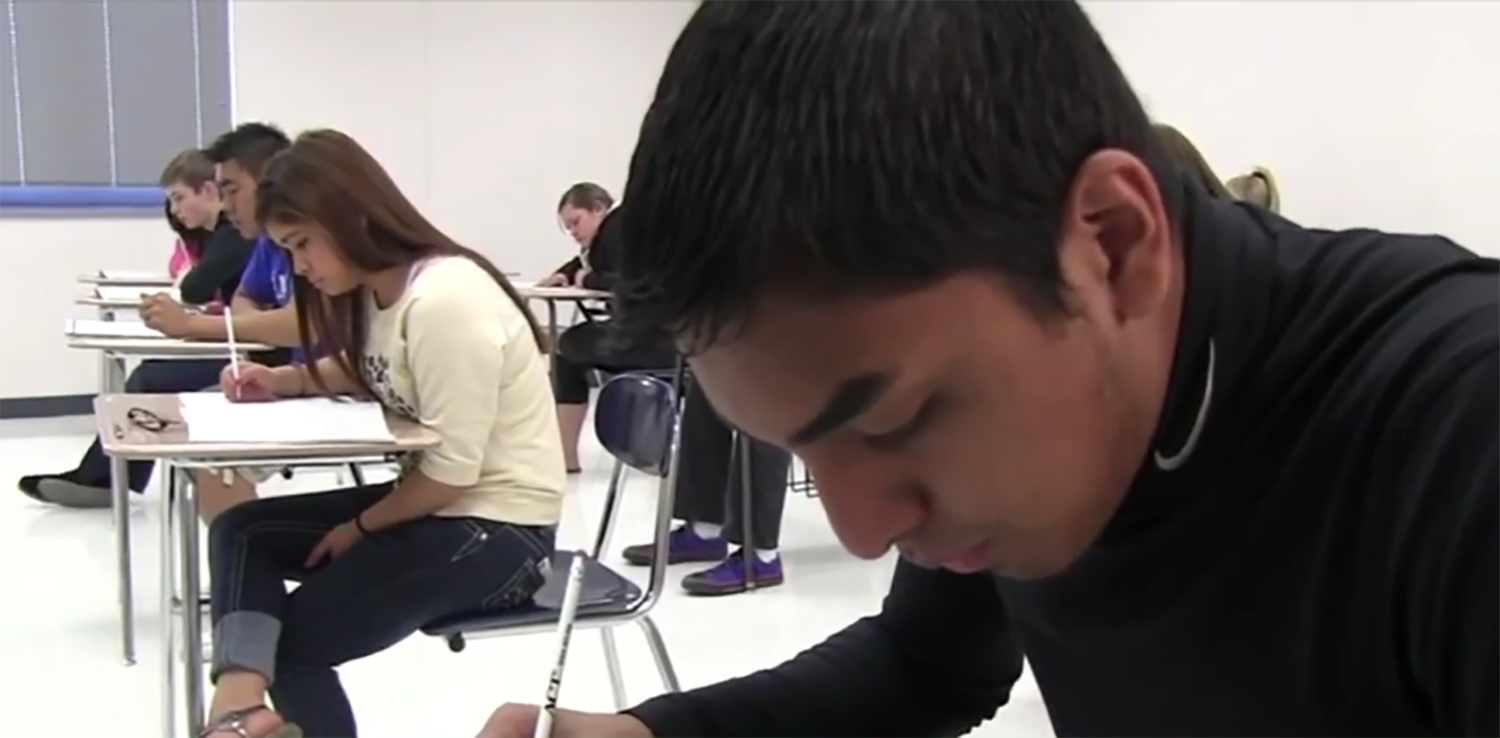Is Revised RESA a Reason to Rejoice?
Part II of II: Teacher Perspectives on the Resident Educator Summative Assessment
Read Part I: My Marathon Swim Through RESA
 by Dan Greenberg, Sylvania Education Association
by Dan Greenberg, Sylvania Education Association
I’m getting to a place where I can look back nostalgically on twenty years in the classroom — back to the days when I was 22, teaching in Adelanto, California, and couldn’t get used to people calling me “Mr. Greenberg,” — a time when I rushed through my lunch in the teacher’s lounge, so I could go play pick-up basketball with the kids.
I don’t gloss over those early years of my career. There were plenty of challenges that made me wonder if I would be able to make it as a teacher.
However, I think the challenges facing today’s early career educators make mine seem laughable. And of all of today’s challenges that I am grateful I avoided, RESA (Resident Educator Summative Assessment) is at the top of the list.
When I graduated from Kent State in 1997, I took two Praxis tests to get my teaching license. That was it. I was official! As for additional requirements from the state, there was nothing more for me to do. As long as my principal was happy with my performance, I could continue teaching.
Compare that to today: a four year Resident Educator program with rules, and meetings, and videotaping, and student work samples, and on and on, all while young teachers are trying to get a handle on day-to-day lesson delivery. Wouldn’t it be better for kids if their teachers didn’t have to worry about the redundant RESA process?
I say redundant because these early career educators had plenty of tasks like RESA to complete during their student teaching experience. If they completed them satisfactorily then, why are they having to prove themselves to a testing company and the state once again?
Now I know that RESA went through an overhaul over the summer. For a while, some first and second year teachers were checking with me every day, hoping the whole program would be eliminated. But somehow — through a process that might best be communicated by a “School House Rock” cartoon — we ended up with a revised form of RESA that, among other changes, significantly cuts down on the tasks a third year RESA teacher must submit to the state.
Are my young colleagues and I jumping for joy? No. Not really.
Sure, we are glad to see a reduction in required tasks. Sure, we are glad that more of the RESA program is controlled at the local district level. We know it is a step in the right direction. However, it’s still a program that we see as mostly redundant and unnecessary.
For me, I see RESA changes like standardized testing changes. I’m glad the state has reduced the number of tests students must take, but do I think the state has fixed the problem of over-testing students? Absolutely not.
RESA is still a burden on local school districts. The cost to my district, just to facilitate year 3 of the Resident Educator Program, will be $15,000 this year. That may not be a huge percentage of our budget, but it is one more thing to pay for instead of other programs.
RESA will continue to frustrate educators, whether for its lack of timely, detailed feedback on assessments, or its illogical requirements for teachers shifting between old and new RESA requirements.
For example: Last year a teacher failed one section of her third year RESA tasks. She failed the section because the student work she submitted was deemed illegible by the evaluator. By Ohio law, she could not resubmit a clearer copy. This year, according to the revised RESA process, instead of having to redo the task, she’ll get mentoring at the local level to help her in that area. However, the only reason she didn’t pass had nothing to do with her competency as a teacher. What kind of mentoring can she possibly receive to address this issue?
On the subject of mentoring, I realize that keeping the RESA requirement for local school districts to provide mentors is a positive thing. I can’t imagine what I would have done without a veteran teacher working with me almost every day, helping me with curriculum and lesson delivery.
My hope for new teachers is that the Resident Educator program continues to evolve into something that truly helps them grow as professionals, instead of something cumbersome and frustrating. I want them to be able to look back in 20 years, with a sense of nostalgia for the beginning of their career, not with a shudder and shiver down their spine, as they recall the hoops they jumped through to complete the Resident Educator program.
Learn more about changes to Ohio’s Resident Educator Program
Save
Save
Medicaid keeps many Ohio public school students healthy
by Becky Higgins, OEA President
 They have books, pencils and a backpack. But will Ohio’s public school students continue to have health care? Maybe or maybe not. It depends on what Congress and the President decide to do about Medicaid.
They have books, pencils and a backpack. But will Ohio’s public school students continue to have health care? Maybe or maybe not. It depends on what Congress and the President decide to do about Medicaid.
About 40 percent of Ohio children receive their health coverage from Medicaid. And in some Ohio school districts, that percentage is even higher. In the Dayton City Schools, 71.7 percent of students are on Medicaid. In Youngstown, 80.5 percent of students are enrolled in Medicaid. In Cleveland, it’s 72.7 percent.
Countless studies have shown that children who have access to regular, consistent health care do better in school. Medicaid is critical to ensuring that Ohio’s public school students have quality health care. Children who receive health care through Medicaid are more likely to graduate from high school, finish college, have fewer hospitalizations and enjoy better health as adults. Children who have Medicaid are less likely to drop out of school, engage in risky sexual activity, smoke, or be overweight. And Medicaid gives struggling families the security of knowing that their household budgets.
No child should be without health coverage and access to needed health care. Medicaid makes that possible in Ohio.
Medicaid is a lifeline that keeps a majority of children healthy in many Ohio counties. Medicaid improves academic performance and attendance. It helps ensure that children receive timely and appropriate care, and can help address behavioral issues including the impact of trauma that poses challenges to the proper learning environment.
In the 1980s and 1990s, researchers studied a group of students to determine the long-term effects of healthcare coverage on education. They found that a 10 percent increase in Medicaid eligibility for kids up to the age of 17 led to a smaller high school dropout rate, greater enrollment in college and a higher percentage who earned a four-year college degree.
Medicaid coverage not only improves children’s health and educational attainment it also enhances their earnings potential. People covered by Medicaid during childhood are healthier adults, with fewer hospitalizations and emergency room visits and higher incomes as adults, studies shows.
And while many districts struggle with financial challenges, Medicaid contributes more than $80 million to Ohio’s public schools to pay for needed services for students with disabilities. These are services that schools are required to provide and Medicaid offers a reliable funding stream to help pay for them.
The bottom line is that Ohio schools and taxpayers win when children in Ohio have Medicaid. In this time of uncertainty about what Congress and the President might do to change Medicaid, it is important that Ohioans let their representatives in Washington know that Medicaid should be protected.
My Marathon Swim through RESA
Part I of II: Teacher Perspectives on the Resident Educator Summative Assessment
Read Part II: Is Revised RESA a Reason to Rejoice?
by Kate Gladieux, Spanish teacher of 5 years, Sylvania Education Association
The why… Teaching sailing
I got into the teaching profession because I grew up as a sailing instructor. I spent many days helping children overcome their fear of water and wind. I liked seeing the students conquer their fears. I decided to be a Spanish teacher for that same reason. Speaking in another language can often be very scary and seeing students break out of their shell and view the world in a whole new light was appealing to me. I’m very passionate about seeing my students succeed. As we all know, teaching is a marathon and not a sprint. This is my experience with required assessment for new teachers to move on to their professional license. It was like a marathon swim.
The before… The lifeboat is nearby!
It started out pretty grand. My first year as a Junior High Spanish teacher began just like any other — I’M JUST TRYING TO SURVIVE! Thankfully, I was assigned a mentor through the RESA (Resident Educator Summative Assessment) program. Yes, “resident” is meant to sound like pre-med students going through med school.
It was great! My mentor and I met regularly to discuss school issues. She helped me get through tough times, brainstorm about interesting situations with students, parents, and administration, and checked to make sure I knew my way around staff meetings. She was even there for me when my personal life got hard. We observed each other and learned things from each other. I felt I was growing AND helping someone else to grow. The first two years were about survival, but I had support and felt at least somewhat successful. The kids had learned something from me. And at least I had her as a lifeboat nearby.
The during… Plan. Re-plan. Teach. Grade. Reflect. Re-reflect. Eat? Sleep? Cry? Repeat!
Things quickly took a turn as I was no longer allowed to consult with my mentor during year 3 of RESA. I felt prepared and extremely confident, but I was treading water on my own. No life boat nearby this time. The support was gone and I must navigate myself to dry land by swimming what felt like a long, long distance. I could barely see land! The final assessment (marathon) had arrived. The days with lack of sleep, food, and exercise were taken over by the preparation of lessons, assessments, professional development, parent contact, among others that result in four long tasks to complete. I feel as though I could write a book on the time I spent attempting to present my best self to the Ohio Department of Education and some strange company called Educopia.
The long story short version includes these thoughts:
- I work hard on my lessons out of my passion to see my students succeed and often create my own. Now it seemed there was not a lot of room for error. We were to record two video clips of lesson cycles (one in the fall and the other before Feb. 15).
- The assessors (who were supposedly teachers from the Ohio Department of Education) use TWELVE rubrics to grade EACH lesson cycle. With each lesson we were asked an overwhelming amount of prompts to explain our reasoning for everything we did. We were not told what a passing grade was, but we were provided the 12 rubrics to base our responses.
- For each question, our responses had to be fewer than 200 words. I found it extremely difficult to get in everything they required on the rubrics with so few words. It started to feel like I needed to be a veteran, perfect performing teacher in order to pass. I am always up for a challenge and I like to better myself in my career, however the additional workload of RESA made day-to-day life a lot more stressful than the ordinary stress I was used to experiencing.
- There were four tasks in total. The other two include “Communication and Professional Development”, “Formative and Summative Assessment” and just as many rubrics. The time to 1) plan, 2) replan, 3) incorporate, 4) reflect, and 5) respond to the prompts took away countless days, weeks, and months from my actual unit planning — and of course that “life” I was trying to have. Trying to type responses with about 30 rubrics in mind during each of the steps for each task was like trying to swim the butterfly in four foot waves while being chased by piranhas. I came up with a great performance! But it was stressful, exhausting, and I never want to do it again. My “free time” thoughts throughout the evenings and weekends were consumed with “how can I make all of these rubrics fit together,” a jigsaw puzzle with 1000 pieces.
- I also spent countless hours double checking my documents and videotapes that I uploaded as evidence. There are many ways to be disqualified with these types of evidence co-decided upon by Educopia and the Ohio Department of Education. I studied every crevice of every piece of evidence, photo scanned and re-photo scanned, and whited out all Personal Identifiable Information from every parent, teacher, and student from every piece until oops I missed dinner again.
- As I approached the final submission date, I wondered if I would feel a sense of relief after hitting that “turn in” button on my computer. I swam really hard to reach the shore for the first six months of school. When I finally hit “submit” I did not feel relief. I did not make it safely to shore. In fact I was trapped just outside the surf with another four months to wait for my results. I would tread water until June 1st.
The after… The piranhas are still there.
School was ending and as you know it’s a busy time of year. I spent the first weekend finishing up my exam grades. I tried to relax and see the friends that I had neglected throughout the year because of RESA once school was finally over. I was even distracted enough that I almost forget about my RESA score, until I realized at 1:00 am on the day they would be posted, that they might already be online. In a panic I grabbed my phone to check the results. There they were! It wasn’t the result I was hoping for. The waves quickly drowned me, as I felt like the biggest failure on the planet. I called my old mentor along with some new ones to try to figure out what had happened and what I could do.
I did not fail the task because of my ability, but because the upload of a document appeared a little fuzzy to the assessor. I had been disqualified because one out of my 40 some pages of evidence had some light student handwriting that the assessor deemed “illegible” and therefore ungradable. The hours, days, and weeks I had spent on that particular task did not even get a second look because of a few lines. This became confusing to me because I had uploaded a TON of other evidence along with my responses to the many prompts and rubrics to showcase that I could accomplish that task. Couldn’t this be rectified with a resubmit? This did not ease my sense of failure as I thought to myself, “this is the biggest humiliation”. I now seem like an incompetent teacher because of a disqualification due to a software issue. This would mean I would need to retake this entire task the following year — and everyone would know! There were still a few piranhas chasing me and I could not relax.
Months later… Did I ever make it to shore?
It’s about 4 months after I first looked at my results. The first two months I could not shake the feeling of devastation. I kept having flashbacks of my evenings and weekends of stress and uncertainty. I relived the dread I had felt toward my profession, not the joy I felt with my mentor. In the last month, the RESA program was changed due to a large push of educators asking for the RESA program to be revoked. Unfortunately, many other new teachers experienced the same results that I had and they pushed for a change to be made.
Did this assessment truly prepare new teachers? Or did it discourage most from entering the already struggling occupation to begin with? The shame that I still feel must be clear from what I have shared here. I am still wading in the water, as the changes that were made put me in a sort of limbo for this school year. I have yet to be informed of what I must complete to obtain my next license. I am proud of the changes that have been made for upcoming teachers. Our voices were heard. I can only hope that this program gives new teachers the confidence and tiny bit of recognition that we so crave (am I doing a good job?).
The four tasks I was asked to complete have been spread out over four years and only one task will be the final assessment, while the others are able to be worked on together with a mentor. At least that’s the last I’ve heard. Even though I’m still wading through the water I am trying to be even more present with my students, friends, family, coworkers, bosses, and myself. After all, it will be me at the finish line everyone remembers, not my scanned PDFs, lessons, and 15 minute video clip.
Learn more about changes to Ohio’s Resident Educator Program
Read more Save
Save
Save
Save
Save
Save
Save
Save
Save
Educators recommend Sherrod Brown for the U.S. Senate
COLUMBUS – October 6, 2017 – The National Education Association’s political action committee, the NEA Fund for Children and Public Education, and the Ohio Education Association’s Fund for Children and Public Education (FCPE) have endorsed Sherrod Brown for the U.S. Senate.
“Sherrod Brown is a proven champion of sound education policies and he has richly earned the endorsement of Ohio educators,” said OEA President Becky Higgins. “He understands that building the foundation of a strong economy starts in our public schools, and he is committed to ensuring that every child has access to a quality education. We look forward to his continued service in the US Senate where we are confident that he will serve the best interests of educators and students.”
The NEA Fund made the endorsement on the recommendation of OEA’s FCPE State Council which met last Saturday, September 30th in Columbus to interview US Senate candidates. The NEA Fund, a federal political action committee, provides financial support to pro-public education candidates without regard to their party affiliation.
The Ohio Education Association (ohea.org) represents 125,000 teachers, faculty members and support professionals in Ohio’s public schools, colleges and universities
Follow OEA @OhioEA on Facebook, Twitter, YouTube, Instagram, and Pinterest.
OEA Awards and Scholarships

OEA is pleased to celebrate, honor, and reward the outstanding work of our members, affiliates, and individuals who have made special contributions to the improvement of public education.
For an application or nomination form, visit the OEA website at www.ohea.org, under AFFILIATE RESOURCES, and select the Grants & Scholarships link.
The deadline for all applications is January 31, 2025.
- OEA BLUE RIBBON ASSOCIATION AWARD | The OEA Blue Ribbon Association Award recognizes a local OEA affiliate for its demonstration of innovative problem- solving techniques and/or unique public relations and communication skills. CLICK HERE TO APPLY
- GLATT/HOLLOWAYS AWARD | OEA recognizes achievements in human relations and related intercultural activities that impact children, communities, the educational process, and/or the United Education Profession by presenting the OEA Glatt/Holloways — Human and Civil Rights Award. CLICK HERE TO APPLY
- DORIS L. ALLEN AWARD | OEA recognizes achievements in human relations and related intercultural activities that impact children, communities, the educational process, and/or the United Education Profession by presenting the OEA Doris L. Allen — Human and Civil Rights Award. CLICK HERE TO APPLY
- ESP AWARD | The Education Support Professional Award is presented each year to an OEA member whose activities reflect the contributions of education support professionals to public education. The recipient must have been a member of OEA for three years as of July 15 of the award year. CLICK HERE TO APPLY
- ESP ASPIRING TEACHER SCHOLARSHIP | The $4,000 ESP Aspiring Teacher Scholarship is presented each year to an ESP member currently enrolled in an undergraduate teacher education program in Ohio or a senior education student who has been formally accepted for graduate study in a master’s degree of education program at an accredited Ohio college or university. Applicants must be current members of the Ohio Education Association. CLICK HERE TO APPLY
- OEA FRIEND OF EDUCATION AWARD | The OEA Friend of Education Award recognizes a person and/or organization whose leadership, actions, and support have contributed to the improvement of public education on a statewide and/or national level. CLICK HERE TO APPLY
- JEAN KERSHAW SCHOLARSHIP | The $2,000 Jean Kershaw Scholarship is presented each year to a student member currently enrolled in an undergraduate teacher education program in Ohio or a senior education student who has been formally accepted for graduate study in a master’s degree of education program at an accredited Ohio college or university. Applicants must be current members of the Ohio Student Education Association and the NEA Aspiring Educator Program. CLICK HERE TO APPLY
- JFK SCHOLARSHIP | The $4,000 John F. Kennedy Scholarship is presented each year to an OEA member who is a career teacher enrolled in a graduate-level program and in need of financial assistance. CLICK HERE TO APPLY
- MARILYN CROSS SCHOLARSHIP | The $4,000 Marilyn Cross Scholarship is presented to an OEA member and career teacher enrolled in a graduate- level program directly linked to his/ her current area of licensure. CLICK HERE TO APPLY
- MEDIA AWARD FOR PUBLIC SERVICE | The Media Award for Public Service recognizes an individual and/or organization for a major contribution to the better understanding of the problems, progress, and needs of public education, or for programming of an outstanding educational nature. CLICK HERE TO APPLY
- OEA PEACE AND INTERNATIONAL UNDERSTANDING AWARD | OEA recognizes individual members and local associations who have furthered the cause of peace and international understanding by presenting the OEA Peace and International Relations Awards. CLICK HERE TO APPLY
Save
Save
Save
Save
Save
Save
Save
There’s still too much testing
Testing has long been misused to the point where it has lost any potential usefulness in the education of our nation’s children. Questions have been raised by parents and educators not only about the amount of testing that takes place, but also the developmental appropriateness. Then there’s the extent to which test results have created a very lucrative and profitable business market. See The Testing Industry’s Big Four and Pearson Rakes in the Profit.
Since at least 2011, there have been clear indications, cited by Dr. Linda Darling Hammond* in Getting Teacher Evaluation Right of significant errors in the use of Value Added Models in teacher evaluations. See http://bit.ly/getting-teacher-evaluation-right.
We do not need tests to tell us that poverty, inequitably funded schools, lack of access to technology, unaccountable charter schools, trauma, poor professional development, large class sizes and too much time on tests all negatively affect students.
More needs to be done to roll back mandatory assessments to a minimum federal level. That requires that we all advocate clearly and consistently with our elected officials using research and our personal experiences. The opportunity is here. Ask your local to conduct a testing audit. Adopt a resolution to limit vendor testing at the local level. Use all the tools at your disposal — phone calls, letters, emails, etc. — to persuade legislators, state board members and/or local board members on the issue. It’s going to take all of us.
* A Footnote – Dr. Linda Darling Hammond will be the keynote speaker, presenter and facilitator of a panel at the Midwest Symposium on Teacher Evaluation on September 30th at the University of Findlay. Consider attending and engaging further on this topic for change. Registration can be found at https://www.findlay.edu/education/graduate-programs/Midwestern-Teacher-Evaluation-Conference.
Watch OEA President Becky Higgins tell ABC6 what’s missing in Ohio’s report cards.
September 2017 Ohio Schools
- IN THIS ISSUE
- Educators and students at center of work to find solutions to Ohio’s growing opioid crisis
- The 2017 OEA Summer Academy
- Maysville EAs successfully organizes to become first Ohio local to win back salary schedule
- Legislative Update, Political Action, and more.
Moved recently? Contact the OEA Member Hotline to update the address on file at 1-844-OEA-Info (1-844-632-4636) or email, membership@ohea.org. Representatives are available Monday-Friday, from 8:30 a.m. to 6 p.m. | OhioSchools — Past Issues
![]()
![]() Oh Yes, We’re Social — Join the Conversation!
Oh Yes, We’re Social — Join the Conversation!
![]()
OEA says new state report cards don’t tell the whole story
COLUMBUS – September 25, 2017 – “The new report cards showing a statewide improvement in student test scores in many but not all areas of the state are a welcome development,” said OEA President Becky Higgins, “as students adjust to new curriculum standards. But the data in the report cards is complicated and doesn’t tell the whole story – namely the socio-economic factors that impact student performance.”
“There continues to be an overreliance on testing in measuring student growth,” said Higgins, “and OEA urges policy makers to find more ways to limit the role of standardized tests so that our students spend less time preparing for and taking tests and are given more time to reap the benefits of learning from our very committed educators across the state.”
“Ohio’s teachers and school support professionals remain focused on inspiring their students to learn and think creatively,” said Higgins. “This commitment to the success of every student regardless of where they live or what their family income may be can be seen every day in classrooms, libraries, cafeterias and school busses across the state.”
The Ohio Education Association (ohea.org) represents 124,000 teachers, faculty members and support professionals in Ohio’s public schools, colleges and universities
Follow OEA @OhioEA on Facebook, Twitter, YouTube, Instagram, and Pinterest.
Part II: Teaching, post-Charlottesville
By Dan Greenburg, Sylvania Education Association
As I plan my lessons for the start of a new school year, I hear student voices in the back of my head, asking “Why do we have to learn this?”
I use that question to guide what I teach and how I teach it.
I find the best way to address that question, without students even having to ask it out loud, is to link literature and writing lessons to things that are relevant to my students, to things that are happening in our world.
When we read Catcher in the Rye, we talk about how Holden Caulfield might have been impacted by social media. Would he have found a community of teenagers just as disillusioned with life as he was? When we read The Great Gatsby, we compare the American dream of the 1920s to today. We talk about college affordability and how that impacts the dreams and goals of students.
Relevancy is the key to my lessons.
Over the past year or so, however, I have found it increasingly challenging to remain relevant. As we become more polarized politically and culturally, I am finding it harder and harder to discuss controversial issues in class. I am actually afraid of the repercussions.
Last February, I taught my 10th grade English class a six-week lesson about persuasion and argumentation. As part of the unit, we talked about using facts to support claims, and the importance of using reliable sources. At the same time, we were studying this, a website called “Uncle Sam’s Misguided Children” published a blog titled: “Is an Ohio High School Teaching Kids to Hate the President.” That blog was about my school. It was clearly biased, and completely inaccurate in its portrayal of our school. It was shared close to 4000 times.
I thought: This is a teachable moment. What better way to demonstrate the problem with unreliable sources than this article, which completely misrepresents our school? Discussing how many times this article has been shared, I can explain how false information is easily circulated on the internet.
With those thoughts in mind, I copied the article and made it the focus of our lesson. I prefaced the lesson by saying we are not focusing on anyone’s feelings about the President or anyone’s political beliefs. This is about the reliability of sources.
I thought I had things covered. I did not.
The discussion seemed to be going very well in class, but within 25 minutes, I got a call from the guidance office to send a student down. I later found out this student sent a text to a parent, saying he was uncomfortable with the lesson. By the end of the period, my principal was in my classroom. At the end of the day, my co-teacher and I had to submit our lesson plans to the Assistant Superintendent.
I do not fault the district at all. They needed to proceed with due diligence. On an intellectual level, I completely understood this. It didn’t stop me, however, from being terrified about the process.
In the end, the district supported me. There was no reprimand. There was a good discussion with the Assistant Superintendent about the process.
There was a lasting consequence, however.
I am weighing the risk/reward of raising “touchy” subjects in my lessons. I even added a section to my course syllabus, stating that is never my intent to push political beliefs or ideologies from the front of the classroom. I will address the issue this coming week at open house, as well.
My American Literature class will start the year reading One Flew over the Cuckoo’s Nest. It presents so many opportunities to connect to our world today, particularly in the aftermath of the events in Charlottesville and the issues related to the taking down of Confederate statues and monuments. It’s not a matter of pushing a viewpoint; it’s a matter of engaging students on a relevant topic and fostering critical thinking skills.
It’s my hope that, by communicating my expectations and intent to parents and students at the beginning of the year, by letting parents and students know I am willing to talk about and address their concerns, that we’ll be able to have thoughtful dialogue in class throughout the year.
I’m sure there will be the occasional “why do we have to learn this?” However, I’m optimistic that connecting lessons to issues that matter to students will greatly reduce the number of times the question get asked.
Read Part I: Teaching, post-Charlottesville
Save
Save
Save
Part I: Teaching, post-Charlottesville
By Julie Rine, Minerva Education Association
If we haven’t already, many of us will soon be giving a lecture about the importance of being respectful to others, following the rules, and being nice. We are going to discuss how name-calling is not appropriate, and how we should all stand up for anyone who is being bullied or intimidated or hurt. During that first day of school lecture, I often tell my high school students that we can’t control what happens in the world outside of our school, but we can control the atmosphere in Room 201. I emphasize that it will be a place where we can all expect to be accepted and valued, a place where we can feel safe and free from violence or harsh words.
This year when I give that talk, it will mean more than ever. For just at the time when school is beginning for most kids and teachers, our country has seen powerful scenes of breaking those rules in full technicolor, complete with torches and clubs and shields, chants and profanity and ethnic slurs, and in the end, murder.
Sitting in our classrooms listening to our rules and expectations are going to be students of various ages, backgrounds and beliefs. It’s not our place to raise those kids or instill our values in them. That job belongs to their families, but teachers can have a powerful impact as well. What exactly is our role when it comes to teaching values? Certainly the concepts of respect, tolerance, and fairness are not strictly liberal or conservative values. Teaching our children that it is not acceptable to label, judge, or mistreat someone based on their skin color, religion or nationality should not be an area of disagreement between Republicans and Democrats.
A former teacher of James Fields, the driver of the car that plowed into the protesters in Charlottesville, said that he felt he had failed as a teacher.* I do not think he failed; he did everything in his power to expose his students to the atrocities of the Nazis in Europe and to relate his lessons to current events. However, his comment did make me reconsider my own decisions as a teacher.
When teaching To Kill a Mockingbird or Maus (a book about a Holocaust survivor’s experience), I try to fit in current articles about the issues of race and prejudice that arise in the books. But when I first started teaching those texts, I did more than squeeze in those connections. My students used to engage in a plethora of activities to help them further analyze how the ugliness of the past can still influence the events of today.
So what changed? High-stakes standardized testing came along. Each year I have left out more and more of the meaningful extension activities in order to allow extra time for test prep. What if my actions have had more dire consequences than I thought? Maybe it’s time that test prep falls into the “squeezing in” category. Maybe it’s time to stop worrying about growth measures and keep or even expand the material and activities that help grow decent human beings.
To be clear, the overemphasis on testing has not lead to a bumper crop of racists and white supremacists, and the teachers who drop time-consuming but worthwhile material to make room for test prep are not to blame for any future abhorrent actions of their students. But could we be doing more to teach tolerance and acceptance?
The ACLU, who went to bat for the organizers of the recent Charlottesville event after their permit was revoked, argues that freedom of speech should be defended for everyone, even those whose views are repugnant to most people. Ideally, everyone gets a voice, and then everyone can form his or her own decision, after “reasonable discourse and debate.”**
Isn’t it part of our job to teach how to engage in reasonable discourse and debate? We can do this while analyzing topics other than politics, of course, but maybe it’s time to stop backing away from political topics when they arise within the context of our lessons. When students start discussing their political views in our classrooms, maybe we should guide those conversations instead of shutting them down to avoid a heated discussion. After all, it is possible to disagree with someone without espousing hatred for others or inciting violence, and we should be modeling that. Furthermore, there is a difference between those who advocate for the right to dominate or subjugate others and those who stand up for the rights of all people to live peacefully without fear of unjust oppression. We need to make that distinction clear to our students, now more than ever.
A few weeks ago, teachers across the country recognized the faces of white supremacists carrying torches on a hot Friday night in Virginia, and they remembered them not as men, but as kids, sitting in their classrooms on the first day of school listening to the Rules and Expectations lecture about respecting others. I can’t imagine seeing one of my students, past or present, at one of those rallies as a participant. But if I do, I don’t want to feel that I could have done anything differently to elicit a better outcome in the forming of his beliefs.
When there is a back-to-school lecture on rules and expectations, let us mean it and let us enforce it, even if it means having some uncomfortable conversations. When there is a way to incorporate current issues while studying the difficult lessons of the past, let us connect the two. When there is hate speech, let us not be weak-willed and call it a mere difference of opinion. Let us be clear that it is a despicable opinion that is not acceptable in our schools or in our streets. When there are teachable moments relating to political issues, let us embrace them. Let us model civil discourse, but when there is racism or prejudice, blatant or subtle, let us confront it without ambiguity.
Debates about freedom of speech, whether or not statues should stay or go, and what to do with the Confederate flag in public places will keep cable news shows busy for a long time to come. But there is a clear right and wrong when it comes to hate speech, a definite line that should not be crossed, and that line must not be erased in our classrooms.
Read Part II: Teaching, post-Charlottesville
*”Teacher says suspected Charlottesville driver James Alex Fields Jr ….” 13 Aug. 2017, http://www.post-gazette.com/news/nation/2017/08/13/James-Alex-Fields-Charlottesville-killing-driver-car-crowd-white-nationalist-rally/stories/201708130175. Accessed 21 Aug. 2017.
**”Why the ACLU defends white nationalists’ right to protest – Vox.” 12 Aug. 2017, https://www.vox.com/policy-and-politics/2017/8/12/16138326/aclu-charlottesville-protests-racism. Accessed 17 Aug. 2017.
Save
Save
Save
Save
Save
Save






